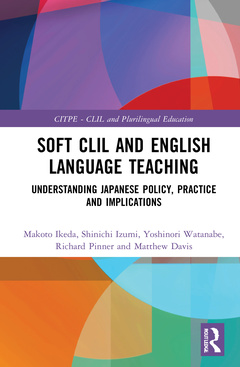Soft CLIL and English Language Teaching Understanding Japanese Policy, Practice and Implications Routledge Series in Language and Content Integrated Teaching & Plurilingual Education Series
Auteurs : Ikeda Makoto, Izumi Shinichi, Watanabe Yoshinori, Pinner Richard, Davis Matthew

Content and Language Integrated Learning (CLIL) is a transformative and powerful approach to language education and has had a significant impact on educational pedagogy in recent years. Despite burgeoning literature on the efficacy and implementation of CLIL, there remains a gap between CLIL and English Language Teaching (ELT). Many practitioners wonder how they can ?do CLIL? if their main classes are focused on English as a Foreign Language (EFL). This volume addresses these concerns by examining the experiences of various CLIL practitioners in the EFL context of Japan.
Chapters outline the CLIL methodology, the differences in ?hard CLIL? (subject led) and ?soft CLIL? (language-oriented) before focusing on the EFL interpretations of soft-CLIL. Although the distinction of hard CLIL and soft CLIL has been mentioned in several publications, this is the first book-length exploration of this issue, featuring chapters examining expectations, challenges, material support, implementation, and even motivation in CLIL classrooms. All of this culminates in a review of the potential and future of CLIL in EFL contexts, paving the way for more widespread and well informed implementation of CLIL all over the world.
Introduction—CLIL in Japan: The case for Soft CLIL in the EFL context 1. ‘How would you like your CLIL?’: Conceptualising Soft CLIL 2. Meeting the challenges of realizing Soft CLIL in EFL classes in Japan 3. Focus on form for content and language integration 4. Concept-centred Soft CLIL: Uncovering concepts in EFL content 5. Pedagogical translanguaging in primary school Maths CLIL lessons 6. Authenticity and motivation in Soft CLIL materials 7. Assessing Soft CLIL 8. The potential of Soft CLIL in light of the diffusion of innovation theory 9. Conclusion—Implications of and challenges for practicing Soft CLIL and a way forward
Makoto Ikeda is a professor in English Philology and English Language Education in the Department of English Literature at Sophia University. He received his MA in Applied Linguistics and English Language Teaching from King’s College London and his PhD in English Philology from Sophia University. He has written various CLIL methodology books and articles for practitioners and researchers in Japan and delivered numerous invited lectures, seminars and workshops for Japanese, Asian and European audiences. His current research interests include the precise nature of integration in CLIL, particularly how grammatical and lexical items are unconsciously acquired while students are consciously engaged in content learning.
Shinichi Izumi is a professor in the Department of English Studies at Sophia University, where he teaches in the BA programme in English Language Studies and the MA and the PhD programmes in Applied Linguistics and TESOL. He received his MA in Applied Linguistics from Southern Illinois University at Carbondale and his PhD in Applied Linguistics from Georgetown University. He has been involved in EFL teacher education throughout Japan and has published widely both nationally and internationally in areas related to instructed second/foreign language acquisition, in particular on topics related to Content-Based Instruction (CBI), Task-Based Instruction (TBI), Focus on form, and Content and Language Integrated Learning (CLIL).
Yoshinori Watanabe is a professor of the Graduate School of Languages and Linguistics at Sophia University. He holds a PhD from Lancaster University, focusing his dissertation on the washback effect of Japanese university entrance examinations. He has a long-standing interest in language learning strategies, language assessment, and CLIL, and he has a number of publications in these areas, including ‘Washback effects of college entrance examination on language learning strategies’ (Bulletin of Japan A
Date de parution : 09-2023
15.6x23.4 cm
Disponible chez l'éditeur (délai d'approvisionnement : 14 jours).
Prix indicatif 48,88 €
Ajouter au panierDate de parution : 08-2021
15.6x23.4 cm
Thèmes de Soft CLIL and English Language Teaching :
Mots-clés :
English Language Teaching; ELT; EFL; Japanese context; Educational framework and paradigms; Hard CLIL; Soft CLIL; Content and Language Integrated Learning; Language Education Policy; CLIL; Foreign Language Teaching Approaches; Test Taker’s Perspective; EFL Textbook; Task Based Language Teaching; Pedagogical Translanguaging; Classroom Translanguaging; Content Based Language Learning; Teddy Bear; EFL Context; EFL Class; EFL Text; Grammar Translation Method; CLIL Classroom; CLIL Teacher; Elt Methodology; CLIL Subject; CLIL Setting; CLIL Lesson; EFL Coursebook; Frayer Model; Concept Mining; Topical Knowledge; CBI; CBLT; Elt Coursebook



